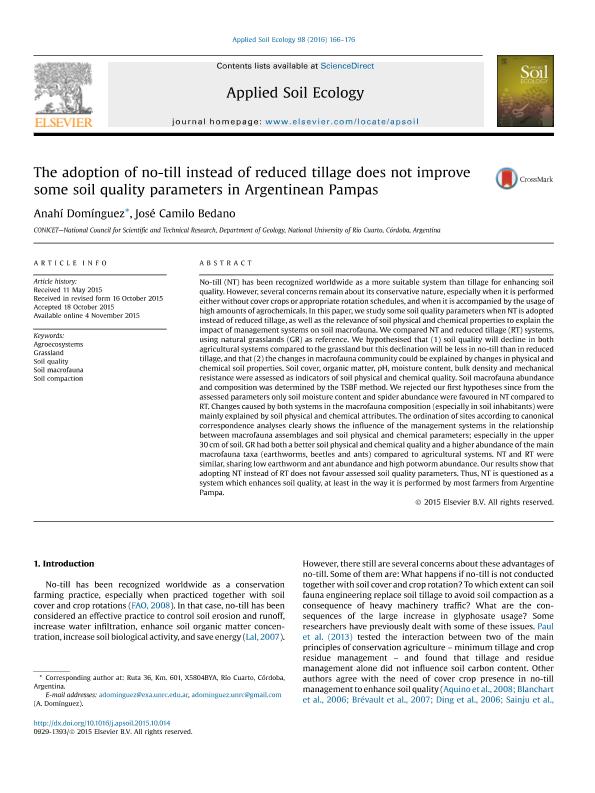Mostrar el registro sencillo del ítem
dc.contributor.author
Domínguez, Anahí

dc.contributor.author
Bedano, José Camilo

dc.date.available
2019-02-11T18:24:07Z
dc.date.issued
2016-02
dc.identifier.citation
Domínguez, Anahí; Bedano, José Camilo; The adoption of no-till instead of reduced tillage does not improve some soil quality parameters in Argentinean Pampas; Elsevier Science; Applied Soil Ecology; 98; 2-2016; 166-176
dc.identifier.issn
0929-1393
dc.identifier.uri
http://hdl.handle.net/11336/69879
dc.description.abstract
No-till (NT) has been recognized worldwide as a more suitable system than tillage for enhancing soil quality. However, several concerns remain about its conservative nature, especially when it is performed either without cover crops or appropriate rotation schedules, and when it is accompanied by the usage of high amounts of agrochemicals. In this paper, we study some soil quality parameters when NT is adopted instead of reduced tillage, as well as the relevance of soil physical and chemical properties to explain the impact of management systems on soil macrofauna. We compared NT and reduced tillage (RT) systems, using natural grasslands (GR) as reference. We hypothesised that (1) soil quality will decline in both agricultural systems compared to the grassland but this declination will be less in no-till than in reduced tillage, and that (2) the changes in macrofauna community could be explained by changes in physical and chemical soil properties. Soil cover, organic matter, pH, moisture content, bulk density and mechanical resistance were assessed as indicators of soil physical and chemical quality. Soil macrofauna abundance and composition was determined by the TSBF method. We rejected our first hypotheses since from the assessed parameters only soil moisture content and spider abundance were favoured in NT compared to RT. Changes caused by both systems in the macrofauna composition (especially in soil inhabitants) were mainly explained by soil physical and chemical attributes. The ordination of sites according to canonical correspondence analyses clearly shows the influence of the management systems in the relationship between macrofauna assemblages and soil physical and chemical parameters; especially in the upper 30. cm of soil. GR had both a better soil physical and chemical quality and a higher abundance of the main macrofauna taxa (earthworms, beetles and ants) compared to agricultural systems. NT and RT were similar, sharing low earthworm and ant abundance and high potworm abundance. Our results show that adopting NT instead of RT does not favour assessed soil quality parameters. Thus, NT is questioned as a system which enhances soil quality, at least in the way it is performed by most farmers from Argentine Pampa.
dc.format
application/pdf
dc.language.iso
eng
dc.publisher
Elsevier Science

dc.rights
info:eu-repo/semantics/openAccess
dc.rights.uri
https://creativecommons.org/licenses/by-nc-nd/2.5/ar/
dc.subject
Agroecosystems
dc.subject
Grassland
dc.subject
Soil Compaction
dc.subject
Soil Macrofauna
dc.subject
Soil Quality
dc.subject.classification
Otras Ciencias Biológicas

dc.subject.classification
Ciencias Biológicas

dc.subject.classification
CIENCIAS NATURALES Y EXACTAS

dc.title
The adoption of no-till instead of reduced tillage does not improve some soil quality parameters in Argentinean Pampas
dc.type
info:eu-repo/semantics/article
dc.type
info:ar-repo/semantics/artículo
dc.type
info:eu-repo/semantics/publishedVersion
dc.date.updated
2019-02-11T14:00:33Z
dc.journal.volume
98
dc.journal.pagination
166-176
dc.journal.pais
Países Bajos

dc.journal.ciudad
Amsterdam
dc.description.fil
Fil: Domínguez, Anahí. Universidad Nacional de Río Cuarto. Facultad de Ciencias Exactas, Fisicoquímicas y Naturales. Departamento de Geología; Argentina. Consejo Nacional de Investigaciones Científicas y Técnicas; Argentina
dc.description.fil
Fil: Bedano, José Camilo. Universidad Nacional de Río Cuarto. Facultad de Ciencias Exactas, Fisicoquímicas y Naturales. Departamento de Geología; Argentina. Consejo Nacional de Investigaciones Científicas y Técnicas; Argentina
dc.journal.title
Applied Soil Ecology

dc.relation.alternativeid
info:eu-repo/semantics/altIdentifier/doi/http://dx.doi.org/10.1016/j.apsoil.2015.10.014
dc.relation.alternativeid
info:eu-repo/semantics/altIdentifier/url/https://www.sciencedirect.com/science/article/pii/S0929139315301074
Archivos asociados
